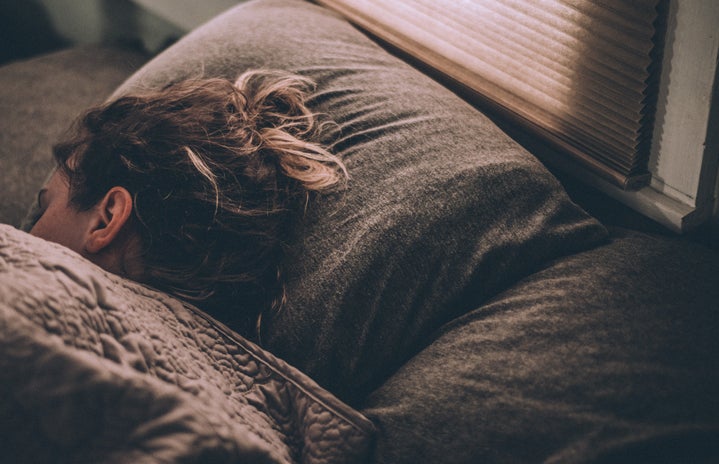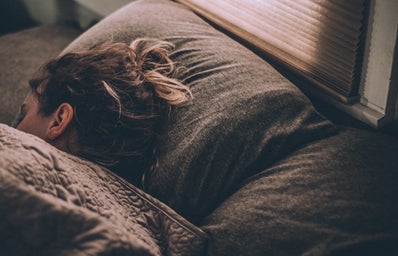It’s 11 PM on a Monday. You’ve just had a long and emotionally taxing day of Zoom classes, catching up on readings, and completing homework assignments. All you want to do is call it a night and drift off into a blissful night of sleep. But when you lay your head down on your pillow, your mind starts racing, running through all of the tasks you have to complete this week. You start thinking about your essay due on Wednesday and your chapter test on Friday. You start worrying about the assignments you haven’t started and wondering how you will fit some study time into your already hectic schedule. These worries are made worse when you remember that you can’t go outside or see your friends safely this weekend to get your mind off of things. Your anxious feelings are heightened. Suddenly, your heart rate increases, you begin to sweat. Just try to relax, you think to yourself. You can deal with this all tomorrow. You glance at your phone and it’s already 1 AM. You try to fall asleep but before you know it, your alarm has gone off and it’s time to start the next day already.
Sound familiar?

Some people are fortunate enough to be able to fall asleep as soon as their head hits their pillow. I am definitely not one of those people. For years, I have struggled with occasional and intense sleeplessness, causing me to have nerve-wracking nights and unproductive mornings the next day. My sleeplessness is typically made worse when I am anticipating an anxiety-inducing event the following day or when I’ve just experienced a stressful day. So, you can imagine how my sleeplessness has intensified amid this anxiety-inducing and stressful pandemic. According to Ethan Gorenstein, an associate professor of behavioral medicine at Columbia University “as anxiety rises due to the coronavirus, sleep difficulty (insomnia) also rises.” Add the stress of COVID-19 to the stresses of being a college student, and it’s a recipe for a restless night of sleep troubles.
I have tried every trick in the book to help remedy my sleeplessness and compiled a list of things that help me fall asleep quicker and improve my sleep quality. I may not be a doctor or medical professional, but if you are looking for ways to combat sleeplessness, I suggest implementing some of these tips into your nightly routine.

1. Spend your evenings relaxing, not working
I try to only complete my school tasks during the day to leave my evenings open for activities that help me unwind, like changing into comfy clothes, reading, yoga, or watching a movie. Reserving my evenings for these easeful tasks gets me in a mindset of rest and relaxation, which makes falling asleep a lot easier. Try to set a time for yourself to stop working each day and start relaxing (mine is usually around 5:00 PM). This may require you to wake up a little bit earlier each day to get all of the work completed that you need to, but eventually, this new schedule will become a habit and allow you to drift off to sleep more peacefully.
2. Try to stay off of your phone right before bed
This is admittedly a very hard thing for me to do. Considering that I am separated from many of my loved ones at the moment, texting is often the easiest way to feel connected to others. However, setting a nightly time for myself to send my “good night” texts and finally put my phone away can allow me to get in the right mindset for sleep. After you put your phone away, try reading, journaling about your day, or meditating to help your mind relax a bit and get ready for sleep.
If you are really struggling to put your phone away right before bed, consider investing in some blue light glasses. Staring at the blue light that comes from screens can not only potentially be damaging for your long-term eyesight, but also contribute to sleeplessness.

3. Meditation
If I had to choose one practice that has contributed the most to my improved sleep quality, it’s meditation. When my mind is racing and I find myself in an anxious state, meditation is one of the things that can help me calm down most effectively. On YouTube, there are many sleep meditations to explore (here is a link to one from Goodful). If you are interested in investing in a meditation app, I suggest Sanvello, Headspace, Peloton, or Calm. Many of these apps require a paid subscription, but also feature free meditations and free trials.
Related to meditation, another practice that has helped me relax in the evenings is restorative yoga. Restorative yoga is a type of yoga designed to help the body relax. There are many different restorative yoga routines on YouTube, check out this one.
And meditation is possible to do without any app at all. Simply try paying attention to your body in your bed and extending your inhales and exhales to get you focused on the present and in a state of relaxation.
4. Diffusing essential oils
An essential oil diffuser is probably one of the best quarantine purchases I have made. Diffusing scents like lavender or eucalyptus really help me relax and calm down before sleep. I also have a lavender essential oil roll-on stick that I like to roll on my wrists and neck before I sleep to help me relax even more.
5. Go to a different room if you’re having trouble falling asleep
After a night of tossing and turning in your bed, sometimes the best fix for sleeplessness can be to get out of your bed. While it might seem a bit counterproductive to leave your bed while you’re trying to fall asleep, it’s often the best choice for me when I am feeling very anxious. If I stay in my bed while my anxious feelings manifest and intensify, I can start to associate my bed with those feelings. Instead, I like to go to a different area of my room or home and do a mundane activity to help my brain calm down, like make a cup of peppermint tea or read a couple of pages of a book. After my anxious feelings subside, I can head back to my bed ready to do what it’s designed for: sleep, not stress.

There is no trusty cure for sleeplessness, as every night and every individual is different. If you try out some of these tips and are still struggling to fall asleep, that is okay. Sleeplessness is bound to happen, but by creating a more easeful nightly routine, hopefully, you will be able to lessen your insomniac episodes and wake up feeling a bit more recharged and prepared for whatever the day throws at you.


